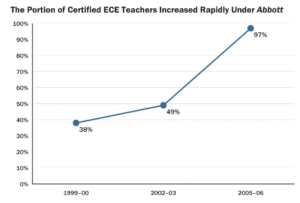
In recent years, state leaders from across the nation have worked to invest in early childhood education (ECE), recognizing both the long-term educational benefits for students and the economic security and growth it can generate for families. As these programs expand, states are beginning to think critically about how they can develop an early childhood workforce that is both diverse and highly qualified.
This week, we welcomed Hanna Melnick and Jessica Barajas of the Learning Policy Institute to the Intersection Webinar to delve into this and more with their recent report Promising Models for Preparing a Diverse, High-Quality Early Childhood Workforce. Utilizing case studies of three programs supporting current and aspiring early childhood educators in California, along with scaled policy changes from New Jersey, this report sheds light on the most effective and replicable elements of programs preparing educators that reflect the diversity of the communities they serve, as well as the potential for the state to support such initiatives.
Key Takeaways
- Since most states lack a single permit or credential in order to work in early childhood education programs, there is no one path to a career in ECE.

- The three case studies examine theFamily Child Care On-the-Job Training Program (FCC Apprenticeship) a California-wide family child care apprenticeship program, Skyline College’s Education/Child Development program, a community college with a lab school in San Bruno, CA, and EDvance, a pathway to a B.A. in early childhood education in San Francisco, CA.
- Four factors were considered for inclusion in the case study. Programs must culminate in a recognized credential, recruit students who reflect diversity of the field, reflect research-based design features, and represent diversity of geography and approach.
- In comparing these three preparation models, six common features emerged:
- Local pipelines and pathways that utilize community partnerships to recruit locally and align with recognized credentials and degrees.
- Early opportunities for hands-on engagement in highly mentored field experiences.
- A supportive community environment for students, faculty and staff through use of a cohort-based model.
- Multi-faceted student advising and financial support to overcome the academic and financial challenges that students of color disproportionately face.
- An ethnically, linguistically, and racially diverse staff that reflect the diversity of the ECE field and have their own opportunities for continued professional development.
- Multiple funding sources and community partnerships are leveraged to strengthen preparation.
- New Jersey successfully implemented many of these elements at the state level following a mandate from the New Jersey Supreme Court. By investing in higher education and ongoing professional learning, the state was able to dramatically increase the number of certified ECE teachers.

Policy Recommendations
- Strengthen early childhood educator preparation through increased access to high-quality field work, increased professional development opportunities for program faculty and staff, and clearer pathways from community colleges.
- Support aspiring early childhood educators by providing financial assistance in addition to advising and academic support.
- In addition to supporting prospective educators, states must work to retain those already in the classroom by adequately compensating early childhood educators, providing ongoing professional development, and collecting better data on the ECE workforce.
For our full conversation with Hanna and Jessica, please watch the webinar below.

Register now for our next Intersection Webinar on Wednesday, January 29, 2020 at 1 p.m. ET when we welcome Lisette Partelow, Senior Director for K-12 Strategic Initiatives at the Center for American Progress, to discuss her recent report, What to Make of Declining Enrollment in Teacher Preparation Programs. This report examines the nationwide decrease in enrollment in teacher preparation programs and provides policy recommendations for state and federal governments to increase data collection and develop targeted solutions to improve teacher preparation.
See you at The Intersection!

The Hunt Institute team





